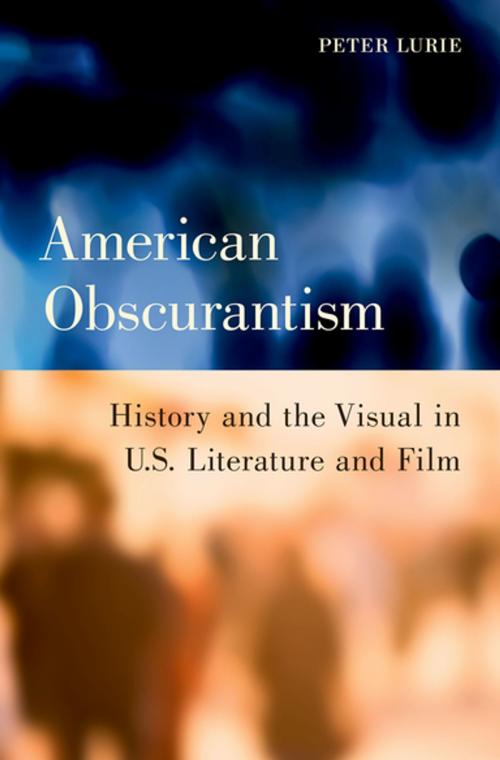American Obscurantism
History and the Visual in U.S. Literature and Film
Nonfiction, Entertainment, Film, History & Criticism, Art & Architecture, General Art, Art Technique, Fiction & Literature, Literary Theory & Criticism| Author: | Peter Lurie | ISBN: | 9780190842635 |
| Publisher: | Oxford University Press | Publication: | May 1, 2018 |
| Imprint: | Oxford University Press | Language: | English |
| Author: | Peter Lurie |
| ISBN: | 9780190842635 |
| Publisher: | Oxford University Press |
| Publication: | May 1, 2018 |
| Imprint: | Oxford University Press |
| Language: | English |
American Obscurantism argues for a salutary indirection in U.S. culture. From its earliest canonical literary works through late twentieth and early twenty-first century film, the most compelling manifestations of America's troubled history have articulated this content through a unique formal and tonal obscurity. Envisioning the formidable darkness attending racial history at nearly every stage of the republic's founding and ongoing development, writers such as William Faulkner and Hart Crane or directors like the Coen brothers and Stanley Kubrick present a powerful critique of American conquest, southern plantation culture, and western frontier ideology. The book traces this arc from one of visual history's notoriously troubled texts: D.W. Griffith's The Birth of a Nation (1915). American Obscurantism engages the basis of these explorations in Poe and Melville, each of whom present notable occlusions in characters' racial understanding, an obtuseness or naïveté that is expressed by a corresponding formal opacity. Such oblique historicity as the book describes allows a method at odds with - and implicitly critical of - the historicizing trend that marked literary studies in the wake of the theoretical turn. Citing critiques such as those of Tim Dean and others of efforts to politicize literary and cultural studies, this book restores an emphasis on aesthetic and medium-specific features to argue for a formalist historicity. Working through challenges to an implicitly white-,bourgeois, heteronormative polity, American Obscurantism posits an insistent, vital racial otherness at the heart of American literature and cinema. It examines this pattern across a canon that shows more self-doubt than assuredness, arguing for the value of openness and questioning in place of epistemological or critical certainty. Following the insistence on a lamenting historical look back in the cases of Faulkner, Kubrick, and the Coens, the book ends by linking Crane's famous optimism in The Bridge, one rooted in an ecstatic celebrating of the body and an optimism attending "America" as both concept and nation-state, to the contemporary digital turn and the hope for a more inclusive visual culture as well as racial vision.
American Obscurantism argues for a salutary indirection in U.S. culture. From its earliest canonical literary works through late twentieth and early twenty-first century film, the most compelling manifestations of America's troubled history have articulated this content through a unique formal and tonal obscurity. Envisioning the formidable darkness attending racial history at nearly every stage of the republic's founding and ongoing development, writers such as William Faulkner and Hart Crane or directors like the Coen brothers and Stanley Kubrick present a powerful critique of American conquest, southern plantation culture, and western frontier ideology. The book traces this arc from one of visual history's notoriously troubled texts: D.W. Griffith's The Birth of a Nation (1915). American Obscurantism engages the basis of these explorations in Poe and Melville, each of whom present notable occlusions in characters' racial understanding, an obtuseness or naïveté that is expressed by a corresponding formal opacity. Such oblique historicity as the book describes allows a method at odds with - and implicitly critical of - the historicizing trend that marked literary studies in the wake of the theoretical turn. Citing critiques such as those of Tim Dean and others of efforts to politicize literary and cultural studies, this book restores an emphasis on aesthetic and medium-specific features to argue for a formalist historicity. Working through challenges to an implicitly white-,bourgeois, heteronormative polity, American Obscurantism posits an insistent, vital racial otherness at the heart of American literature and cinema. It examines this pattern across a canon that shows more self-doubt than assuredness, arguing for the value of openness and questioning in place of epistemological or critical certainty. Following the insistence on a lamenting historical look back in the cases of Faulkner, Kubrick, and the Coens, the book ends by linking Crane's famous optimism in The Bridge, one rooted in an ecstatic celebrating of the body and an optimism attending "America" as both concept and nation-state, to the contemporary digital turn and the hope for a more inclusive visual culture as well as racial vision.















